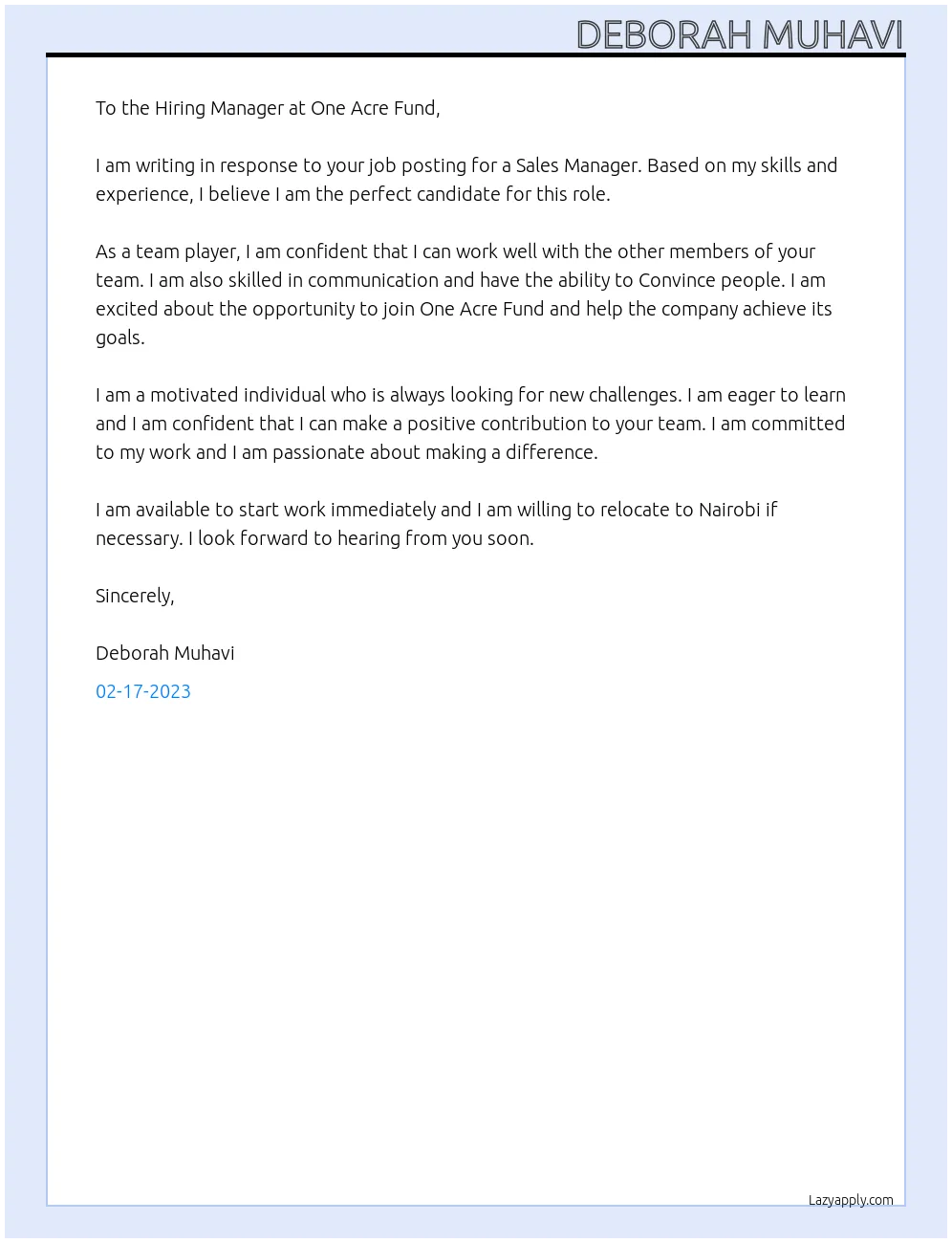What is a Sales Manager Cover Letter
A Sales Manager Cover Letter is a crucial document that accompanies your resume when applying for a sales management position. Its primary purpose is to introduce you to the hiring manager, highlight your key qualifications, and express your interest in the specific role. It’s an opportunity to go beyond the bullet points of your resume and tell a compelling story that showcases your personality, passion for sales, and how your skills align with the company’s needs. A well-crafted cover letter can significantly increase your chances of getting an interview, making it a vital part of your job application strategy. Consider it your first impression, and a chance to stand out from the competition by demonstrating your understanding of the role and your ability to contribute to the company’s success.
Key Elements of a Sales Manager Cover Letter
A strong Sales Manager Cover Letter encompasses several key elements that work together to present you as a qualified and compelling candidate. These elements should be strategically woven throughout the letter to create a cohesive narrative. Start with a professional salutation, addressing the hiring manager by name whenever possible. The opening paragraph should immediately grab the reader’s attention by expressing your enthusiasm for the role and mentioning where you saw the job posting. The body of the letter should showcase your sales achievements, leadership skills, and relevant experience, providing specific examples to back up your claims. Conclude with a strong closing statement, reiterating your interest and inviting the hiring manager to contact you. Remember to maintain a professional tone, use clear and concise language, and proofread meticulously for any errors. The overall goal is to provide a clear and concise picture of your skills and qualifications, demonstrating how you can contribute to the company’s success.
Highlighting Sales Achievements
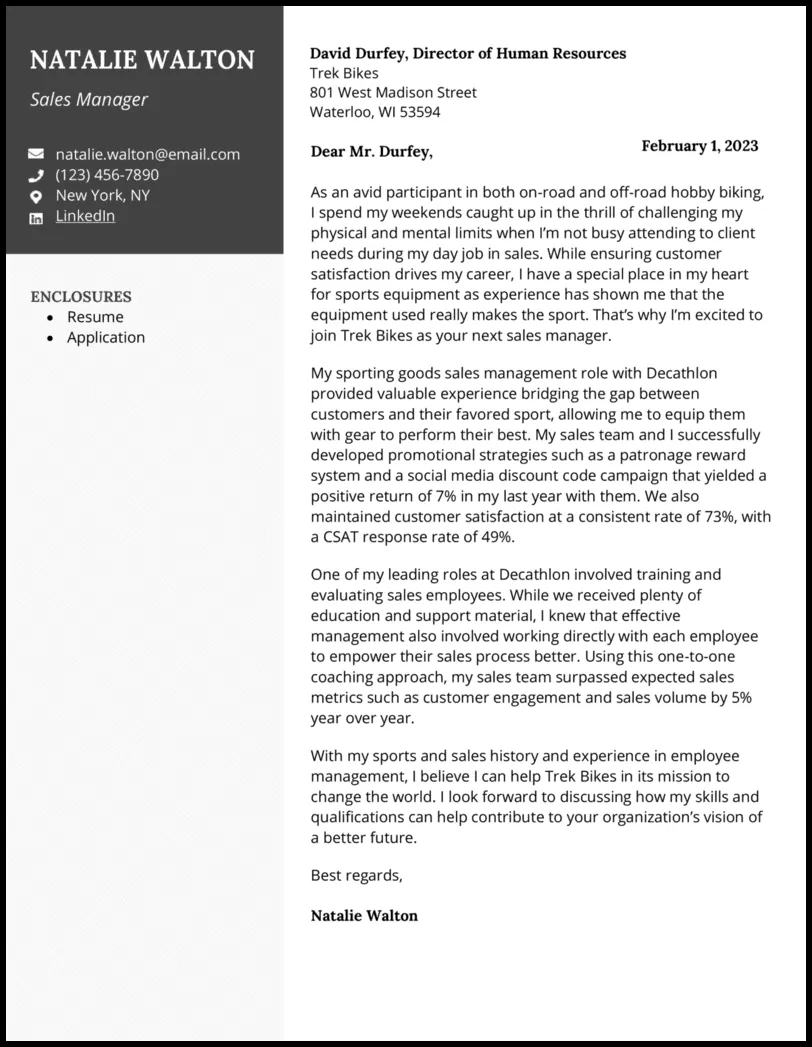
When showcasing your sales achievements, it’s essential to move beyond generic statements and provide concrete evidence of your success. This is where you demonstrate your ability to deliver results and contribute to the bottom line. Use quantifiable metrics, such as percentages and dollar amounts, to demonstrate the impact you’ve made in previous roles. Focus on achievements that are relevant to the sales manager position you’re applying for, such as exceeding sales targets, increasing revenue, acquiring new clients, or improving sales team performance. By providing specific examples and using data to support your claims, you can effectively convince the hiring manager of your ability to achieve similar results for their company. Remember to tailor your achievements to align with the specific requirements and goals of the role.
Quantifying Accomplishments
Quantifying your accomplishments is crucial for making a strong impression. Instead of saying “Increased sales,” state “Increased sales by 25% within one year.” Instead of saying “Managed a sales team,” say “Managed a team of 10 sales representatives, consistently exceeding quarterly targets by an average of 15%.” Use numbers and percentages to provide concrete evidence of your success. For example, “Grew revenue by $500,000 in Q4.” or “Reduced customer churn by 10% through improved customer retention strategies.” By quantifying your accomplishments, you provide tangible proof of your skills and abilities, making it easier for the hiring manager to assess your value and potential contribution to their team.
Showcasing Leadership Skills
As a sales manager, leadership skills are paramount. Your cover letter should demonstrate your ability to motivate, mentor, and guide a sales team. Emphasize your experience in building high-performing teams, fostering a positive work environment, and developing sales strategies that drive results. Highlight your ability to delegate tasks effectively, provide constructive feedback, and resolve conflicts. Focus on your ability to inspire and motivate your team, as well as to identify and nurture talent. Leadership is not just about directing; it’s about empowering others to achieve their full potential. Demonstrating your leadership capabilities will significantly enhance your chances of landing the sales manager role, so provide specific examples of how you’ve led teams to success.
Providing Examples of Leadership
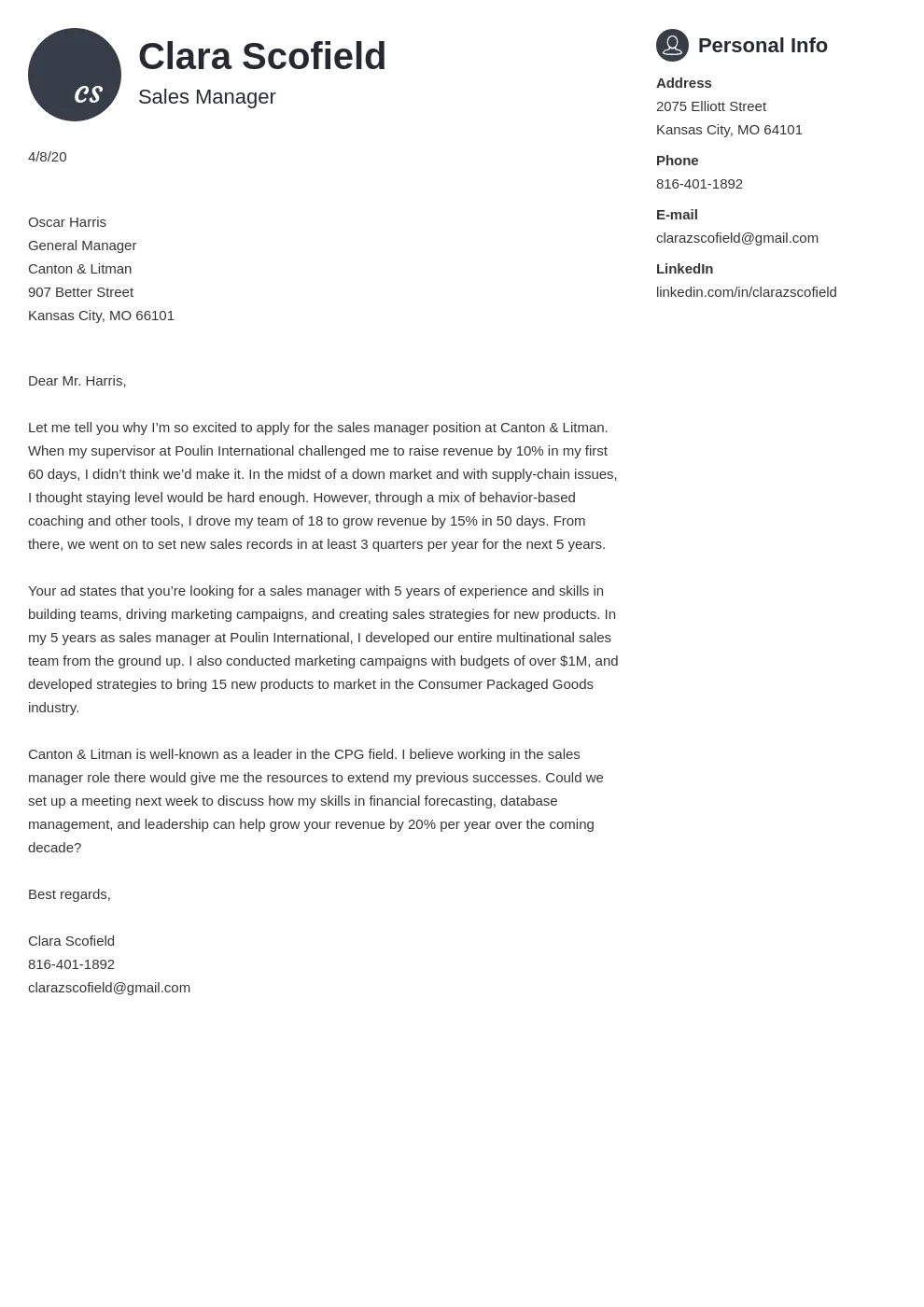
Support your leadership claims with specific examples. Instead of saying “I am a good leader,” state “As a team leader, I implemented a new training program that increased team productivity by 20% within six months.” If you’ve mentored team members, say “Mentored three junior sales representatives, resulting in two promotions and one top performer award.” If you’ve successfully turned around a struggling team, detail the actions you took and the results you achieved. For instance, “Restructured the sales process, resulting in a 30% increase in conversion rates.” These concrete examples bring your leadership abilities to life, making them more believable and impactful. Providing examples ensures that your cover letter stands out and demonstrates that you possess the essential qualities of a successful sales manager.
Demonstrating Relevant Skills
The best Sales Manager Cover Letter goes beyond general statements. It specifically addresses the skills that are vital for a sales manager role. These skills should align with the requirements outlined in the job description. When preparing your cover letter, identify the key skills the company is looking for, such as sales strategy development, lead generation, team management, and customer relationship management (CRM). Then, provide examples of how you have utilized these skills in the past to achieve success. Show your ability to adapt to market changes, create effective sales plans, train and mentor sales teams, and manage client relationships. This targeted approach, emphasizing skills that specifically match the job requirements, allows the hiring manager to quickly see that you have the expertise and capabilities to excel in the role.
Communication and Interpersonal Skills
Effective communication is key for a sales manager. Highlight your ability to communicate clearly and persuasively with both internal teams and external clients. Mention your experience in presenting sales pitches, negotiating contracts, and building strong relationships. Interpersonal skills are equally important, demonstrating your ability to build rapport, resolve conflicts, and motivate your team. Showcasing your ability to listen attentively, understand diverse perspectives, and build strong relationships with colleagues and clients. These soft skills are crucial for creating a positive work environment and fostering successful sales outcomes.
Sales Strategy and Planning
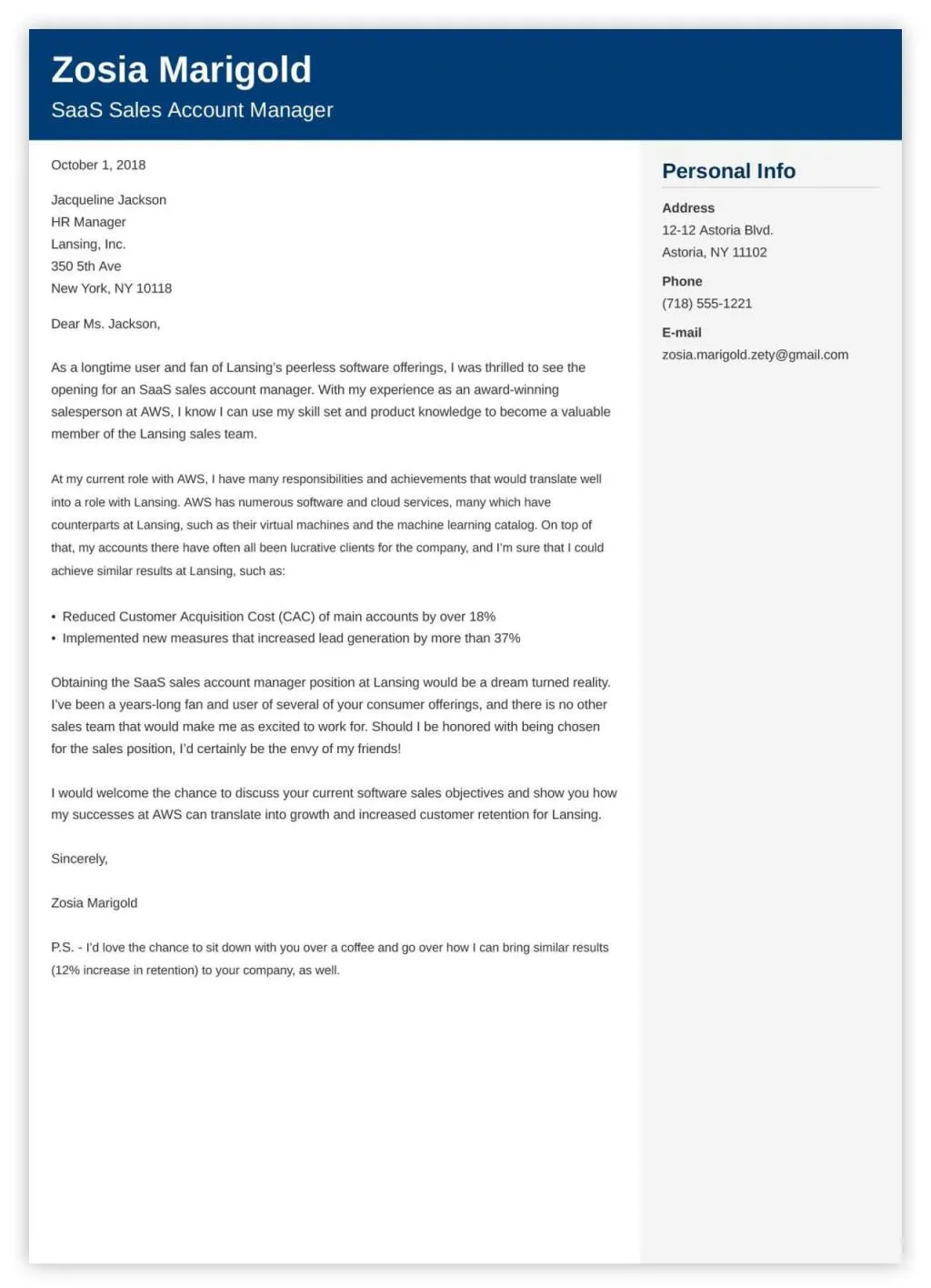
Demonstrate your ability to develop and execute successful sales strategies. If you’ve created and implemented sales plans, mention the specific strategies you used, and the results achieved. If you have experience in market analysis, target audience identification, or the development of sales forecasts, be sure to highlight these skills as well. Also include any experience in the use of CRM software or sales analytics tools. Your cover letter should showcase your understanding of the sales process and your ability to develop and implement strategies that drive revenue growth. Demonstrate your ability to think strategically, adapt to changing market conditions, and continuously improve sales performance.
Tailoring Your Cover Letter
A generic cover letter will rarely make a strong impression. Tailoring your cover letter to each specific job application is essential. This means carefully reviewing the job description and identifying the key requirements and preferred qualifications. Then, adjust your cover letter to highlight the skills, experiences, and achievements that are most relevant to the position. Research the company and understand their business goals and values. Use this information to demonstrate how your skills and experience align with the company’s needs. This approach shows that you’ve taken the time to understand the role and the company, which significantly increases your chances of getting noticed. Tailoring your cover letter takes extra effort, but it is a key step to a successful job application.
Researching the Company
Before writing your cover letter, research the company to understand their mission, values, and recent achievements. Visit their website, read their press releases, and check their social media profiles. This information will help you tailor your letter and demonstrate your genuine interest in the company. For example, if the company emphasizes innovation, highlight your experience with innovative sales strategies. If they’ve recently launched a new product, mention your experience selling similar products or your enthusiasm for their new venture. When you research the company, you can also identify specific challenges they face and address them in your letter. This shows that you not only understand the job but also the company’s needs, making you a more compelling candidate.
Matching Skills to Job Requirements
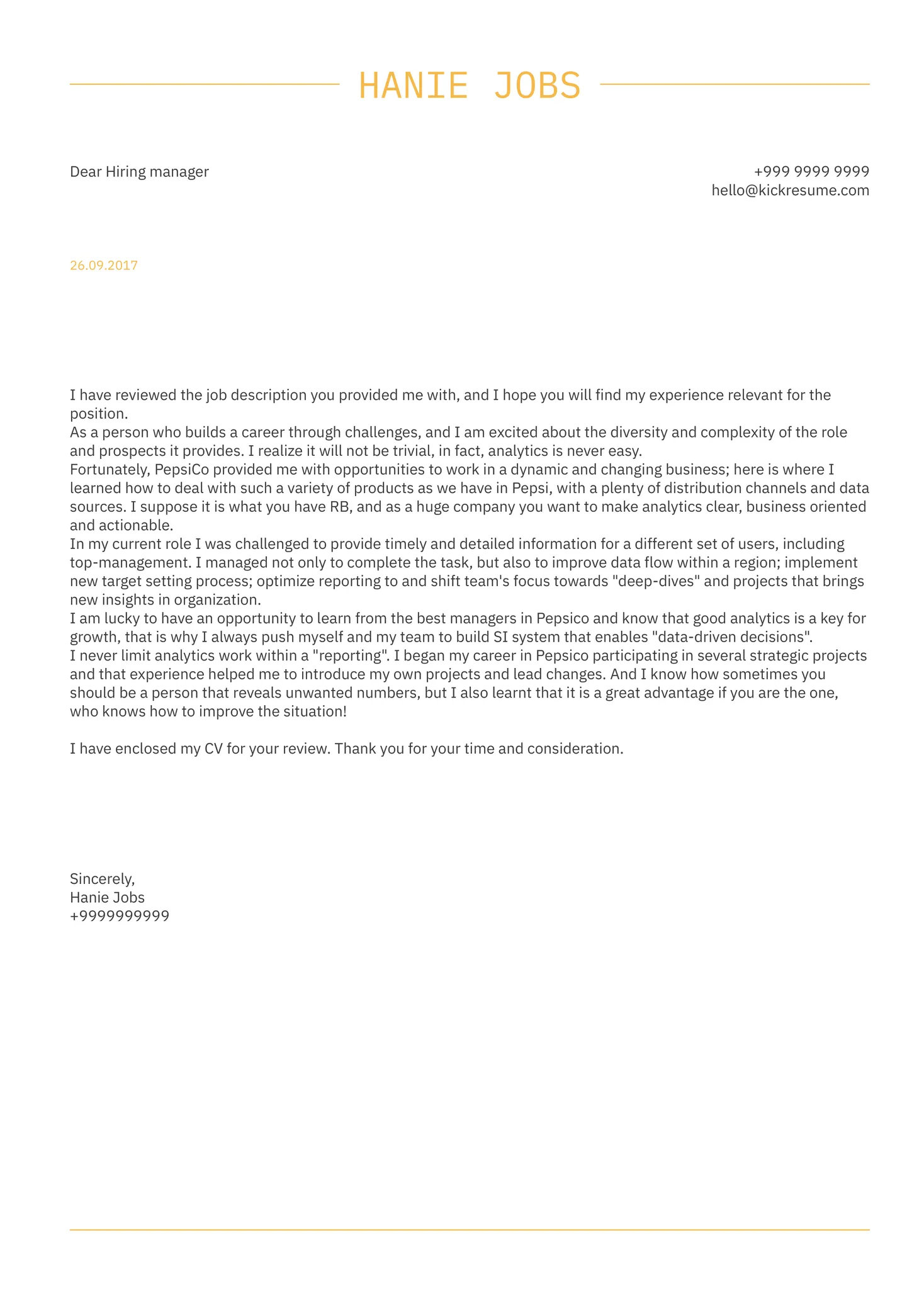
Carefully review the job description, and make a list of the required skills and qualifications. Then, map your skills and experiences to those requirements. This is not just about listing your skills, but about demonstrating how you have used those skills to achieve success. Use the same keywords and phrases used in the job description, but don’t just copy and paste. Instead, integrate those keywords naturally into your narrative, providing specific examples that support your claims. For example, if the job description calls for experience with CRM software, describe how you used CRM tools in previous roles to improve sales performance. By aligning your skills with the job requirements, you make it easy for the hiring manager to see that you are a strong fit for the role.
Formatting and Structure
A well-formatted cover letter is easy to read and visually appealing. It demonstrates professionalism and attention to detail. Use a standard business letter format, with your contact information at the top left, and the hiring manager’s contact information on the right. Use a professional font, such as Times New Roman, Arial, or Calibri, and maintain consistent font sizes. Keep the letter concise, ideally no more than one page, using clear and concise language. Use bullet points to highlight key achievements and skills, making the information easier to digest. Ensure that your cover letter is well-structured, with clear paragraphs and headings to guide the reader through the information. A well-formatted letter shows the hiring manager that you respect their time, and that you pay attention to detail.
Opening and Closing Statements
The opening and closing statements are critical for making a strong impression. The opening paragraph should immediately capture the reader’s attention. Start by stating the position you are applying for and where you found the job posting. Then, express your enthusiasm for the role and briefly mention what makes you an ideal candidate. In your closing paragraph, reiterate your interest in the position and the company. Thank the hiring manager for their time and consideration. End with a call to action, such as “I look forward to hearing from you soon” or “I am eager to discuss my qualifications further in an interview.” Proofread these statements carefully, as they set the tone for your entire application.
Formatting and Design Tips
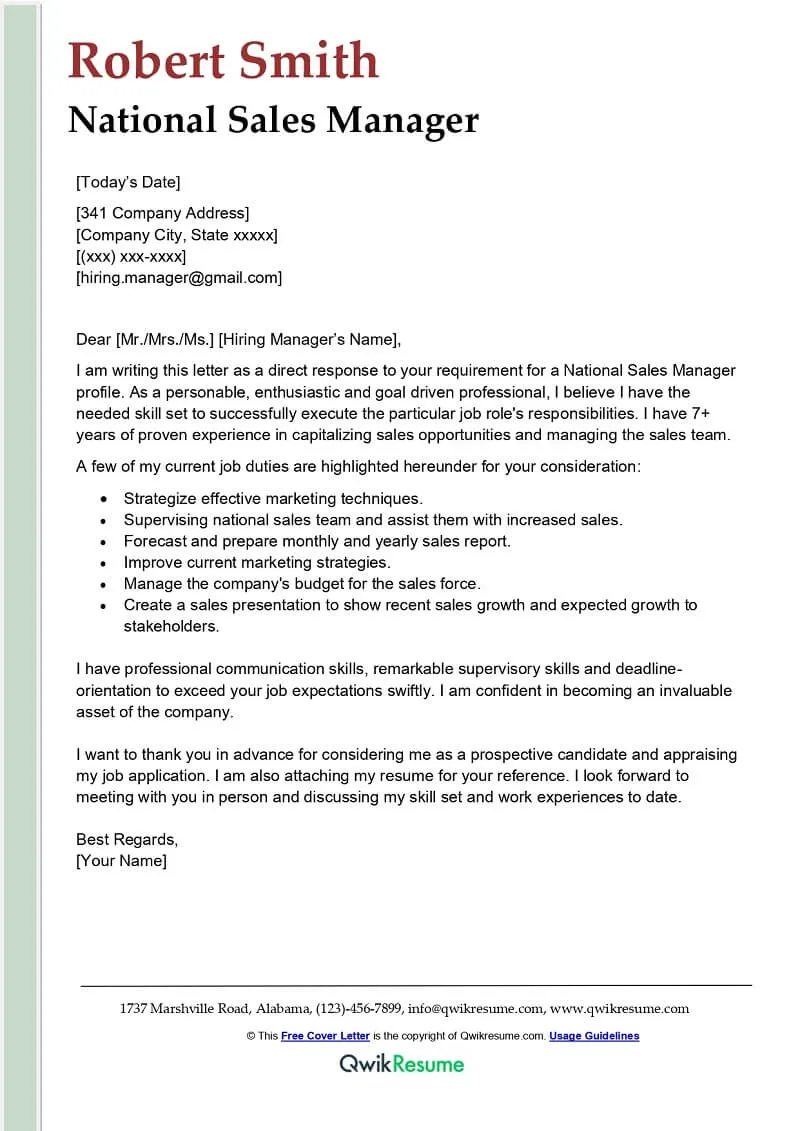
Use a clean and professional design to make your cover letter visually appealing. Choose a professional font that is easy to read, and use a font size between 10 and 12 points. Use clear headings and subheadings to break up the text and make it easier to scan. Use white space effectively to avoid a cluttered appearance. Avoid using excessive colors, graphics, or unusual fonts, as these can distract from the content. Maintain a consistent margin and spacing throughout the document. Save your cover letter as a PDF file to preserve the formatting and ensure that it looks the same on any device. By focusing on formatting and design, you create a polished and professional look that can make your cover letter more impactful.
Review and Proofreading
Thorough review and proofreading are essential steps to ensure your cover letter is free of errors. Typos, grammatical errors, and inconsistencies can undermine your credibility and make a negative impression. After you’ve written your cover letter, take a break and then review it with fresh eyes. Check for any spelling errors, grammatical mistakes, and punctuation errors. Ensure that the formatting is consistent throughout the document. Read the letter aloud to identify any awkward phrasing or unclear sentences. Use a grammar checker to catch any errors you may have missed. Consider having a friend or colleague review your cover letter. They can provide a fresh perspective and identify any mistakes or areas for improvement that you may have overlooked.
Common Mistakes to Avoid
Avoid common cover letter mistakes that can hurt your chances. Do not use a generic cover letter; always tailor your letter to the specific job and company. Avoid repeating information that is already in your resume; use the cover letter to elaborate on your qualifications and highlight your achievements. Do not use jargon or overly complex language. Keep your writing clear, concise, and easy to understand. Avoid sounding desperate or overly enthusiastic. Maintain a professional and confident tone. Do not include negative information about previous employers or colleagues. Focus on your strengths and accomplishments, and how they relate to the role. By avoiding these common pitfalls, you can create a more effective cover letter that increases your chances of success.
Getting Feedback
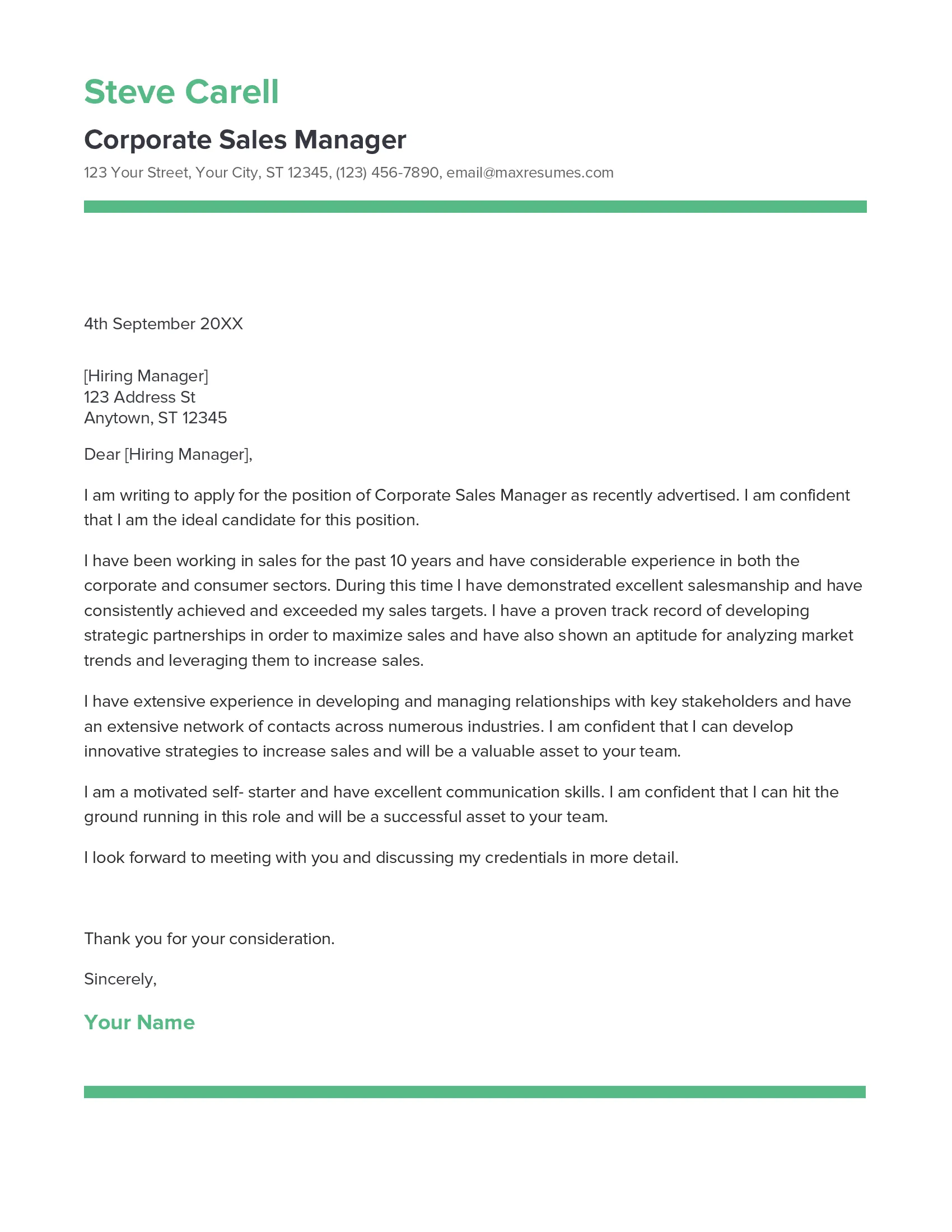
Getting feedback from trusted sources can provide valuable insights and help you improve your cover letter. Ask a friend, family member, or career counselor to review your letter and provide constructive criticism. Ask them to check for clarity, grammar, and overall impact. Be open to their suggestions, and willing to make revisions based on their feedback. Consider getting feedback from someone in the sales field, or someone who has experience hiring sales managers. Their insights can be particularly valuable, as they can assess your cover letter from the perspective of a hiring manager. Getting feedback will help you identify areas for improvement, making your cover letter stronger, and increasing your chances of landing an interview.
